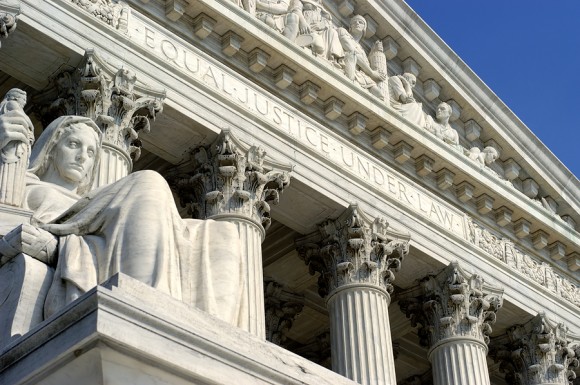A U.S. Supreme Court ruling that Abercrombie & Fitch Co. can be sued for denying employment to a woman wearing a head scarf will compel companies large and small to brush up on the nuances of bias and do more to accommodate employees’ religious beliefs.
In Monday’s 8-1 decision, the Supreme Court said companies can face discrimination claims even if managers didn’t know for sure that a job applicant had religious reasons for wearing a certain garb or needing time off. Federal law requires employers to accommodate religious needs when feasible.
The ruling underscores the need for businesses to be more attuned to workers’ religious beliefs. With some diversity experts saying millennials are far more likely to confidently wear a hijab or a sari or other non-Western clothing to work than their parents ever did, that means extra training to make sure policies and bosses are in step with the times.
“The policies won’t go out the door, but HR needs to be aware, and they probably already should have been aware, that people have the right to be free from discrimination,” said William Burgess, senior staff attorney for the Council on American-Islamic Relations in Washington.
Those type of cases may arise more as younger workers take inspiration from the gains on diversity rights for women and for same-sex couples, said Subha Barry, vice president and general manager of Working Mother Media Inc. and a former global head of diversity at Merrill Lynch & Co.
“My niece’s best friend is Muslim and wears a hijab, while her mother perhaps didn’t have the confidence to do that,” Barry said. “There’s been a dramatic generational change.”
Abercrombie Case
Abercrombie declined to hire Samantha Elauf in 2008 at its store in Tulsa, Oklahoma, in part because the scarf she wore to her interview didn’t comply with the company’s dress code.
A federal appeals court said that wasn’t religious discrimination because Elauf didn’t explicitly tell an Abercrombie interviewer she was wearing the scarf for religious reasons. The Supreme Court decision sends the case back to a lower court, without specifying the next steps.
The ruling puts a burden on small businesses that don’t have large human resource and legal departments to deal with the nuances of religion and how to accommodate those practices, said Karen Harned, executive director of the Small Business Legal Center for the National Federation of Independent Business. Most owners are taught not to ask about religious beliefs because that could lead to charges of discrimination.
“The way the standard is now, it’s going to be confusing for small business owners and could lead to more litigation,” said Harned, whose organization filed a friend of court brief supporting Abercrombie & Fitch. “That’s the bottom line.”
Gender Issues
The scarf ruling not only supported religious freedom in hiring but also gender equity, said Penny Venetis, executive vice president and legal director of Legal Momentum, the New York-based nonprofit that advocates the legal rights of women.
“Even though this ruling was about religious freedom, it was also against gender discrimination and stereotypical thinking about beauty in hiring decisions,” Venetis said.
The case is reminiscent of lawsuits filed by female flight attendants in the 1970s and 1980s who challenged dress codes imposed on them by airlines that mandated wearing short skirts and revealing clothing — and won in court, she said.
“Dress codes can be a license to discriminate about people” and especially women, Venetis said.
Some Exceptions
Courts have largely found that appearance can’t be a factor in hiring or firing if it isn’t a key part of one’s job. But that isn’t always the case. An Atlantic County, New Jersey, court in 2013 ruled that cocktail waitresses can be hired and fired based on appearance, especially weight.
Superior Court Judge Nelson Johnson ruled that Borgata Hotel Casino & Spa was within its right to limit the weight gain of its scantily clad cocktail servers, known as “Borgata babes.”
Studies have found that women and men who are considered good looking and who dress neatly and wear traditional career clothing often get preference in hiring, especially for sales and service jobs.
For now the decision will be more likely to affect rank-and-file workers than executives, who rarely use religious garb, according to corporate recruiters.
“I have never seen it in corporate America — ever,” said Pat Cook, chief executive officer of Cook & Co., a boutique search firm in Bronxville, New York that places top-level executives. “Given the speed with which same-sex marriage has been accepted, I bet this issue will win acceptance in a few years.”
The case is Equal Employment Opportunity Commission v. Abercrombie & Fitch, 14-86.
–With assistance from Greg Stohr in Washington.
Related:
- Supreme Court Backs Muslim Woman’s Job Bias Claim Over Head Scarf
- Supreme Court to Weigh Rejection of Muslim Applicant Over Head Scarf
- Muslim Woman To Sue Disneyland Employer
- Supreme Court Rules Religious Ministers Not Covered by Job Bias Laws
- Top 25 Workplace Harassment, Bias Settlements
- EEOC Sues N.Y. Health Firm for Religious Discrimination
Was this article valuable?
Here are more articles you may enjoy.



 Insurance Issue Leaves Some Players Off World Baseball Classic Rosters
Insurance Issue Leaves Some Players Off World Baseball Classic Rosters  The $10 Trillion Fight: Modeling a US-China War Over Taiwan
The $10 Trillion Fight: Modeling a US-China War Over Taiwan  Florida Insurance Costs 14.5% Lower Than Without Reforms, Report Finds
Florida Insurance Costs 14.5% Lower Than Without Reforms, Report Finds  Kansas Man Sentenced for Insurance Fraud, Forgery
Kansas Man Sentenced for Insurance Fraud, Forgery 

